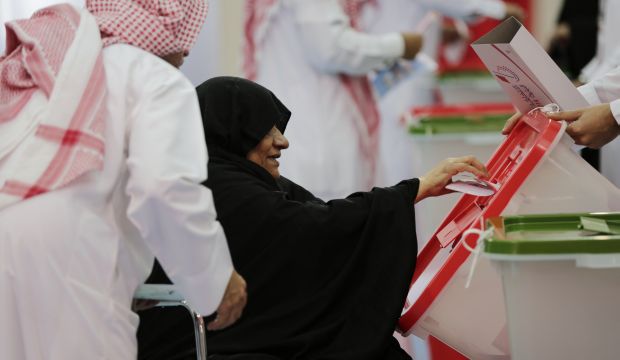Bahrainis have headed to the polls in large numbers for their country’s parliamentary elections, with the turnout exceeding 51 percent despite the calls for a boycott of the polls from the opposition, led by Al-Wefaq, the country’s main Shi’ite opposition group. Despite a number of religious fatwas being issued aiming to scare people away from voting, these elections have finally laid waste to an oft-repeated myth, one that has long been a favorite of Western governments and international organizations. The Bahraini people—Sunni and Shi’ite alike—have proven they cannot be controlled or manipulated that easily—whether by Al-Wefaq or anyone else—and have let their voices soar high in their participation in the country’s elections, even compared to the previous one, which was not boycotted by Al-Wefaq and managed to draw in 67 percent of the electorate.
Al-Wefaq has been utilizing this “myth of the majority” in Bahrain for years now. Its demise means the group can no longer legitimately claim to speak for the Bahraini people at large, and must make do with speaking on behalf of its members and supporters only. It cannot even now claim to speak on behalf of the country’s Shi’ites, many of whom came in droves yesterday to vote in these elections.
Of course Al-Wefaq has the right to continue its “bold, solid stance,” which amounts to basically refusing any agreement that could end the current political crisis in the country. Of course it has the right to bank on regional events playing in its favor inside Bahrain. As it has the right to hold fast to its impossible conditions for taking part in the political process in the country.
But what it does not have the right to do from now on is to presume to talk on behalf of the Bahraini people, to constantly mention their rights, demands and problems: this myth has been well and truly busted, and Al-Wefaq must now search for a new one to help it make the rounds abroad and use as a springboard at home.
We have to commend the Bahrainis on this democratic victory, which shows their determination to continue with the roadmap of political reforms in their country. They could easily have succumbed to the boycott; but what good would that have done, except delay the flowering of the country’s developing democracy, which is yet to bloom into full maturity? For democracy is not a standardized prescription you get from international organizations, one following the same standards whichever country you’re in, whether in Scandinavia or Africa.
Democracy is above all a natural developmental process issuing from the womb of its own society, and so reflects its predispositions and conforms fully to its own domestic standards. Don’t the democracies of Norway and Sweden surpass that of the United States? Can one, for example, compare Germany’s democratic system with Turkey’s? Even standards of freedom of speech vary between Western countries. We see Belgium now enacting a decision to withdraw citizenship from any Belgian who goes to fight with an extremist group abroad. Is this a natural decision for a democracy such as Belgium, which almost sanctifies personal freedoms? Sure, there can be differences of opinion on this point, each with their own merits—not mentioning that, in the end, the decision is one coming out of a society wishing to shape a democracy that also best protects its own citizens, rather than one whose apparent weaknesses may be exploited by some to harm others.
In this paper yesterday, Dr. Bakir Al-Najjar compared the steps taken by the Jordanian and Kuwaiti opposition in boycotting their countries’ own parliaments, and what this means for Al-Wefaq. As did Samir Atallah, when he described the boycott in Bahrain as being more than a wasted opportunity—a case of “outright deception,” in fact. But here are the Bahraini people, announcing through these elections that they are committed to building their country’s democratic future, not to damage or even obliterate it, despite Al-Wefaq and those like it.
The important question is this: Will Al-Wefaq now finally admit that the myth is dead, that the last of these myths had nothing to do with a majority?

Trackbacks/Pingbacks